The document summarizes the origins of the Knights of the Golden Circle (KGC) organization in the 1830s. Originally called Southern Rights Clubs, they advocated reopening the international slave trade and acquiring new slave territories. In the 1830s-1840s, some clandestinely outfitted slave ships. They saw opportunities to expand slavery through the Mexican-American War in the 1840s and into the 1850s supported acquiring Cuba and repealing the Missouri Compromise. The organization grew but lacked structure until the 1850s when it was systematized and named the Knights of the Golden Circle, with the goal of expanding slavery and possibly seceding from the United States.
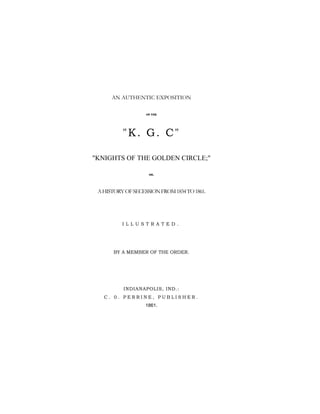
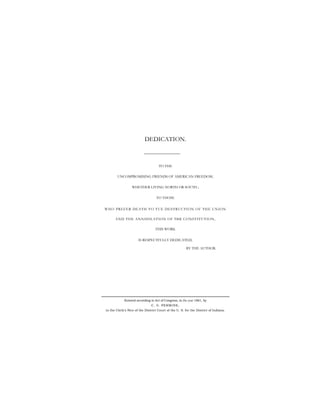
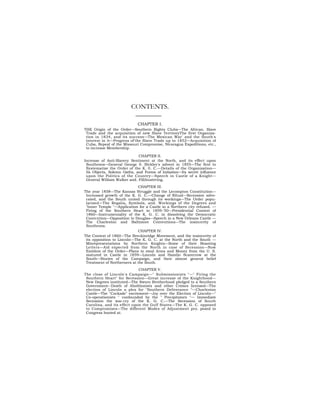
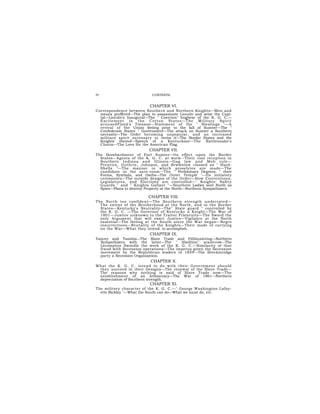
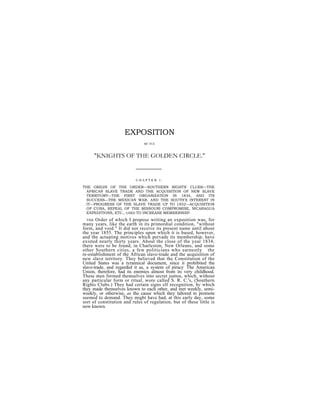
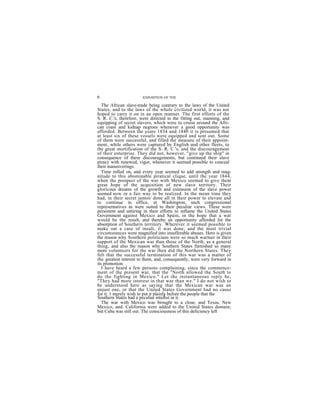
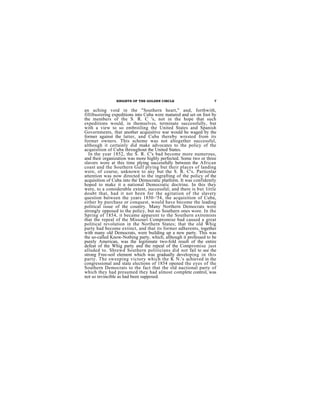
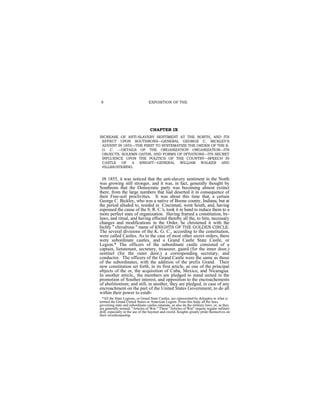
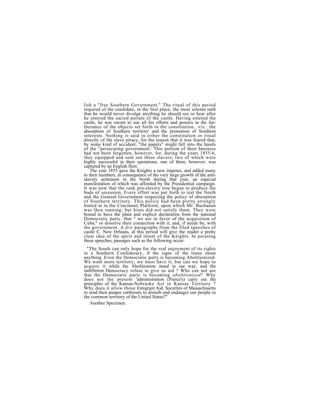
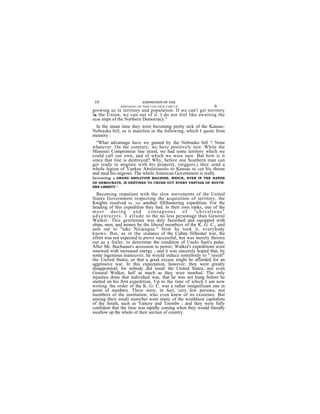
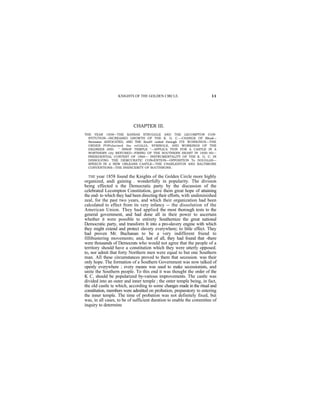
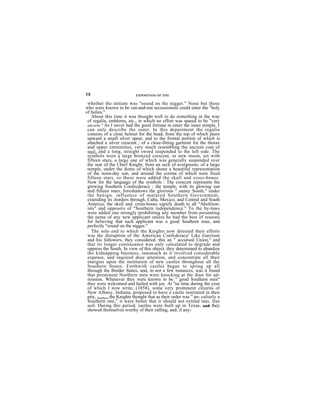
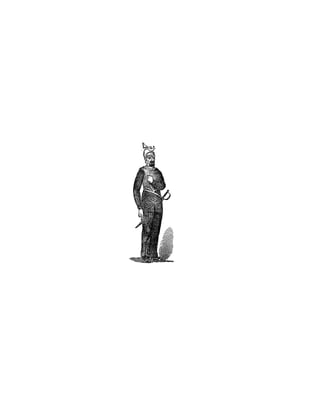
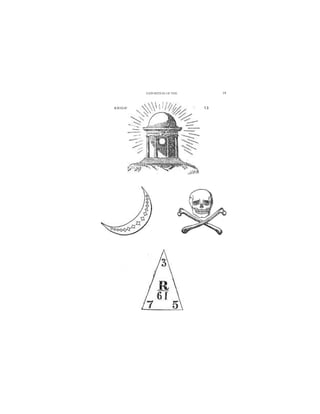
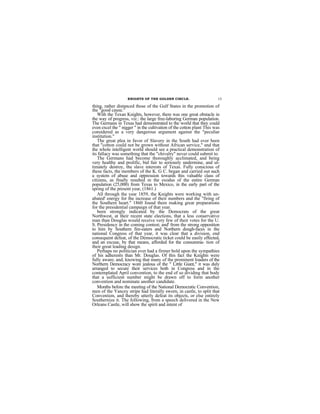
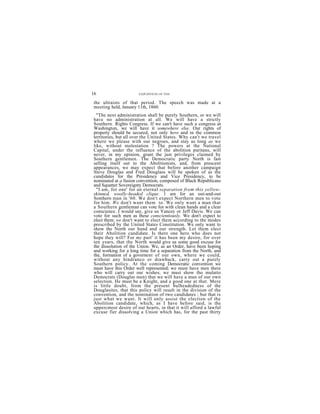
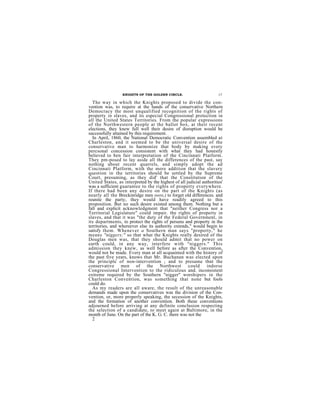
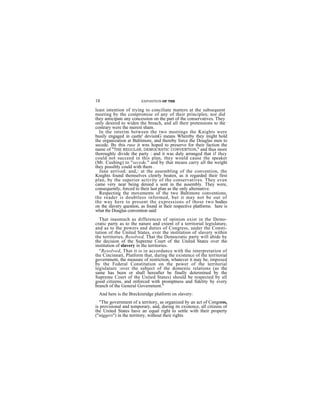
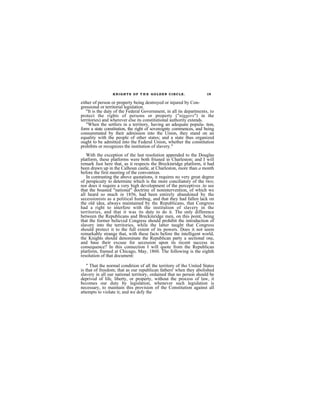
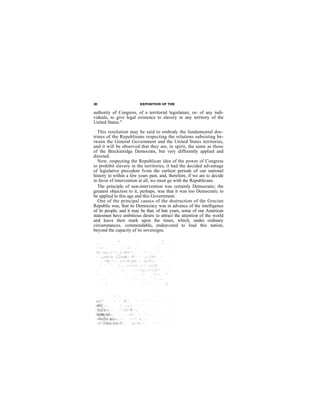
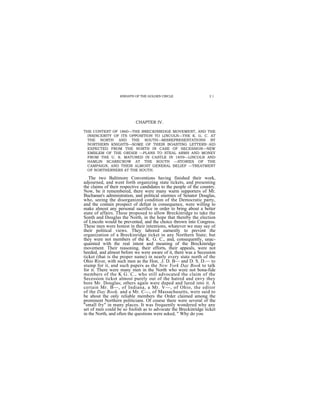
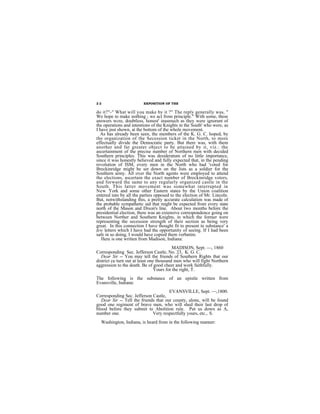
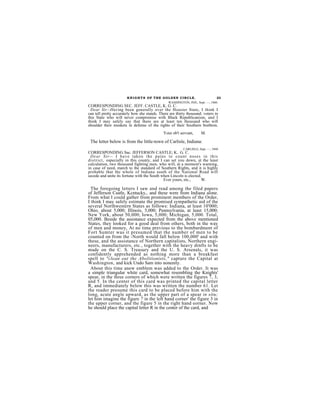
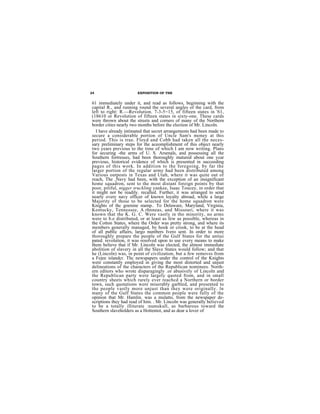
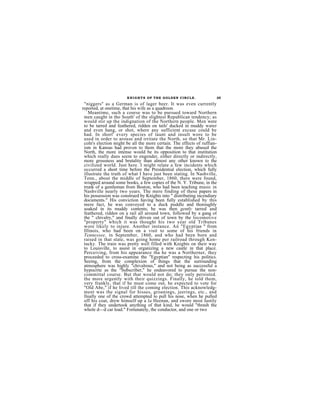
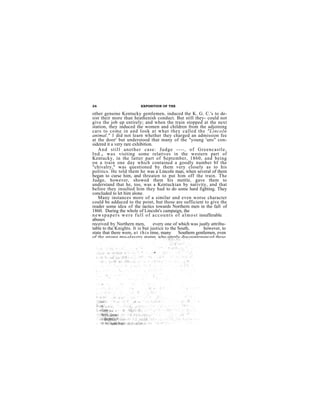
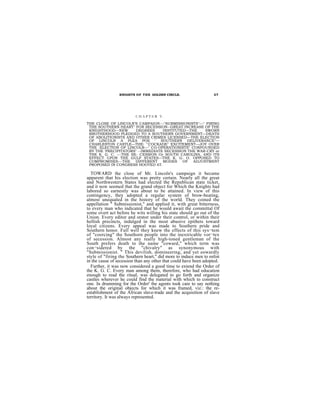
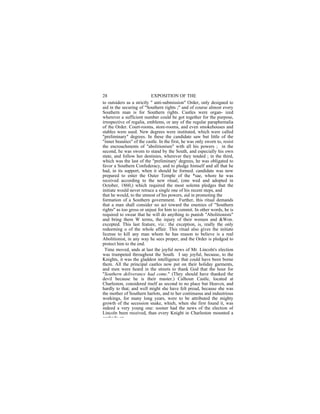
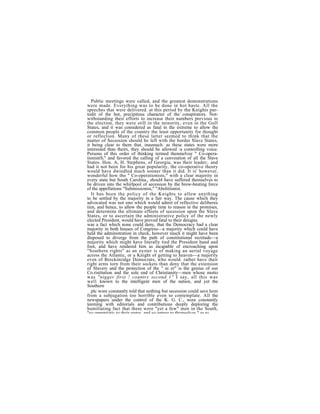
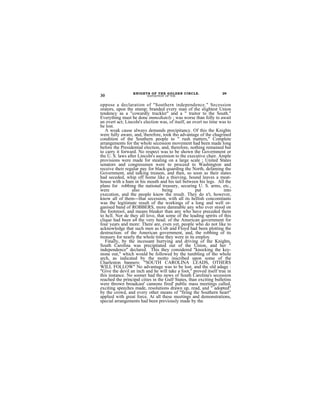
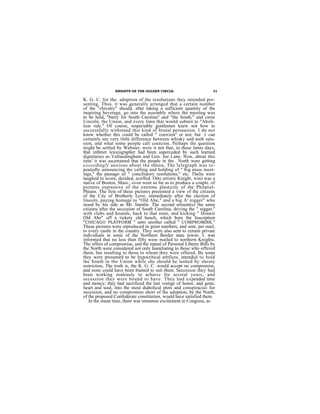
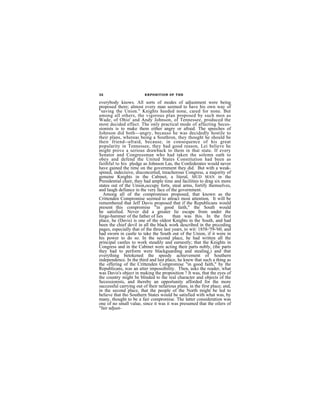
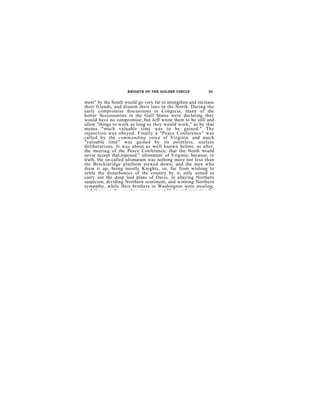
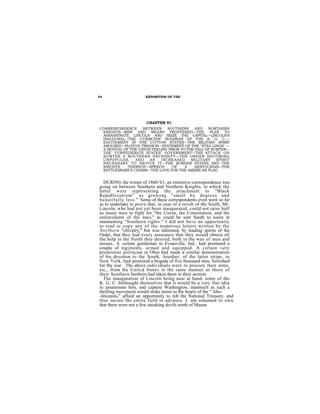
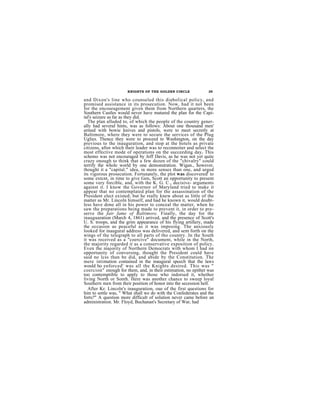
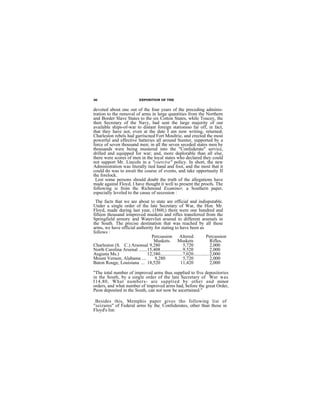
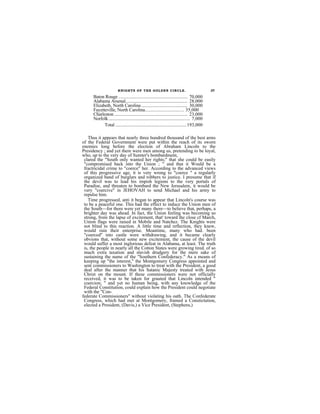
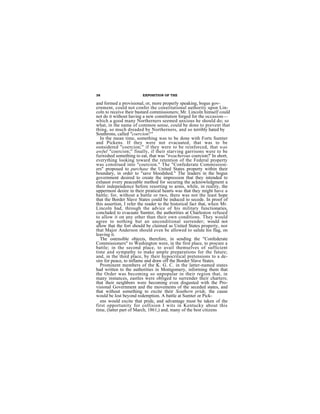
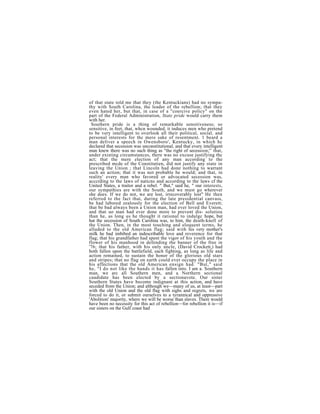
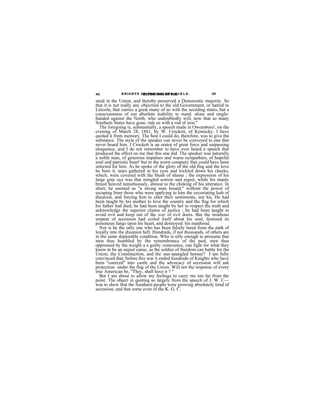
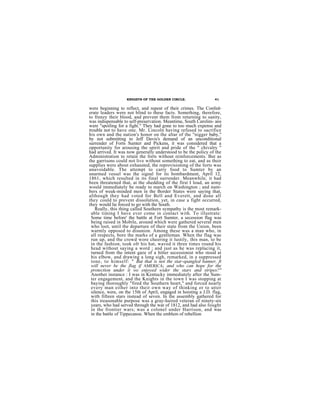
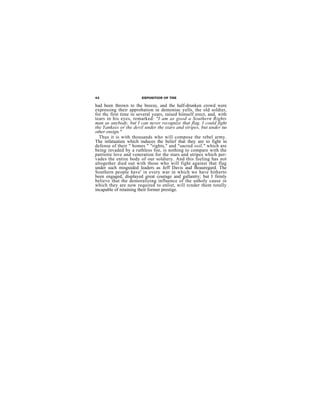
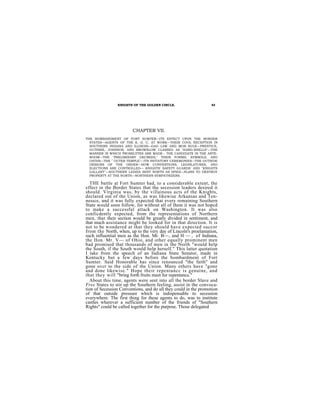
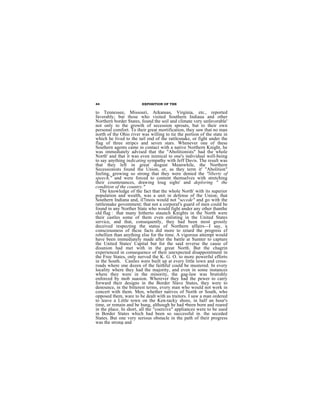

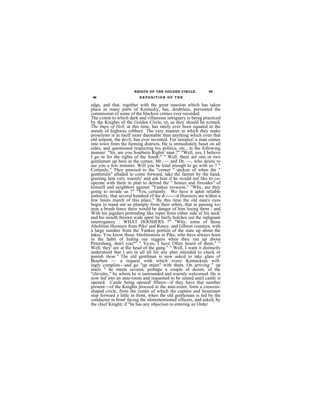
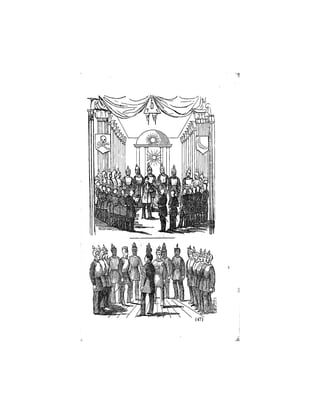
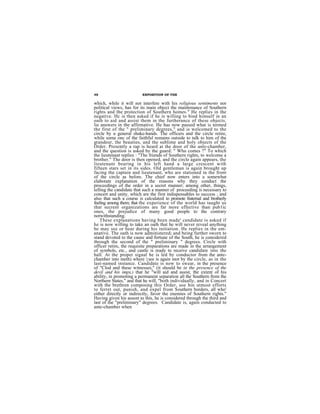
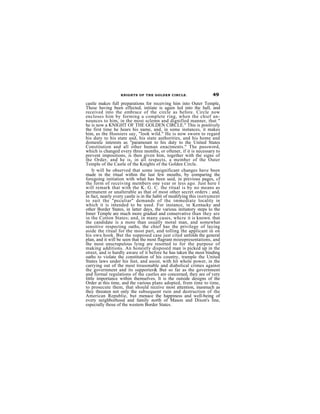
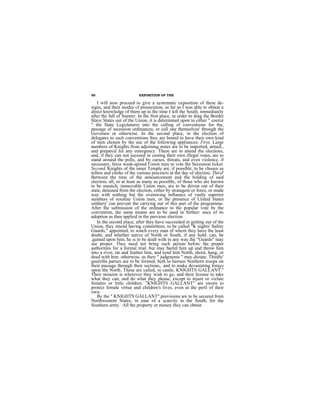
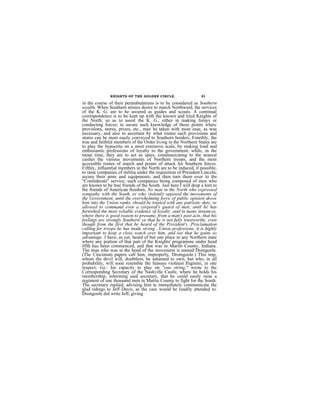
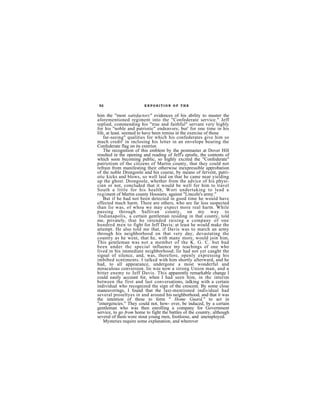
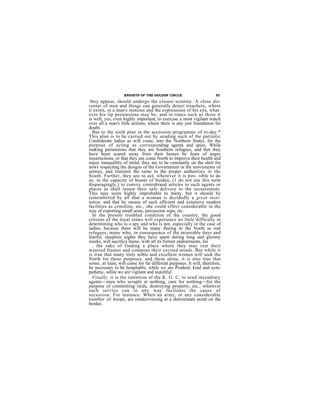
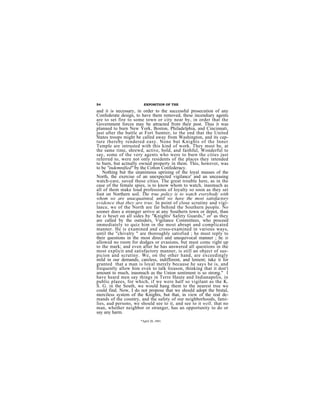
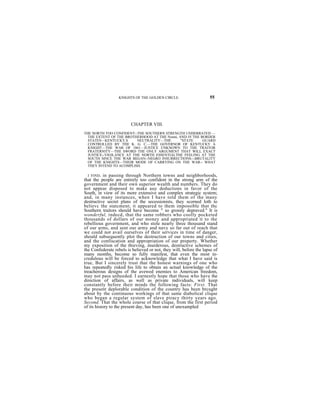
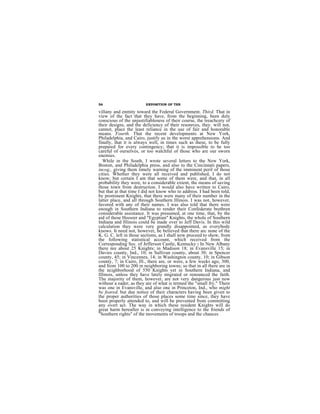
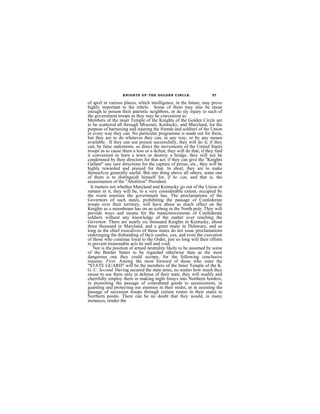
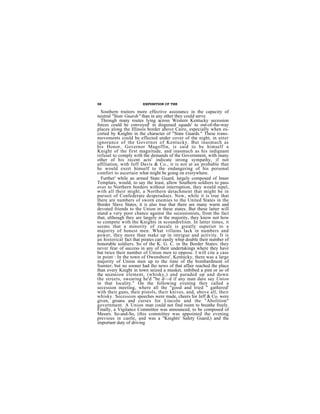
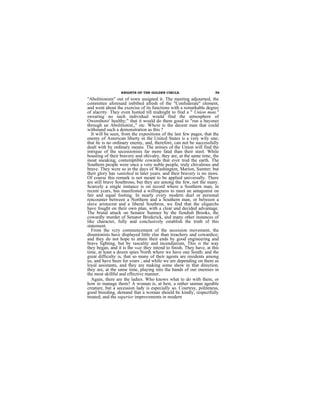
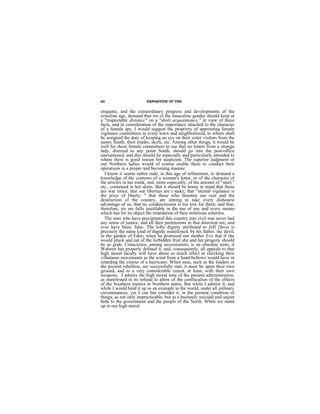
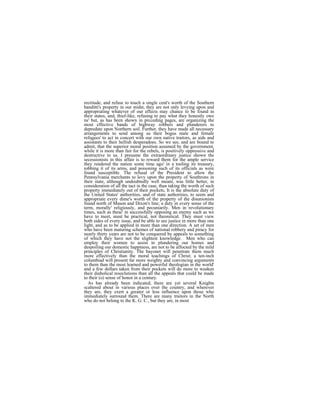
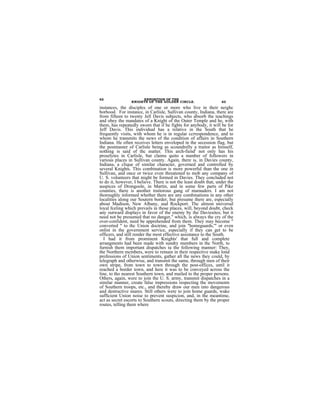
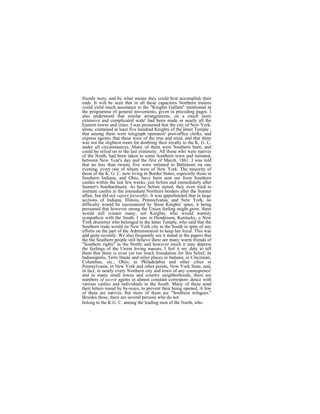
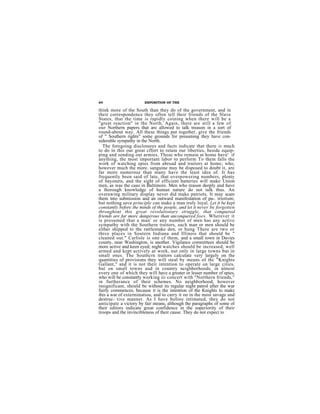
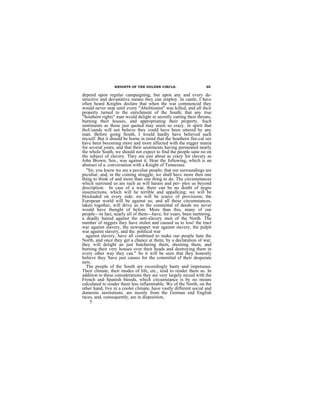
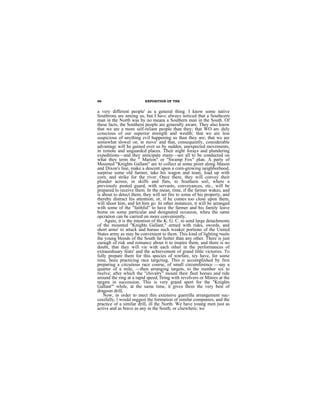
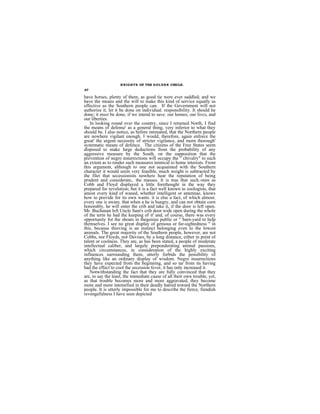
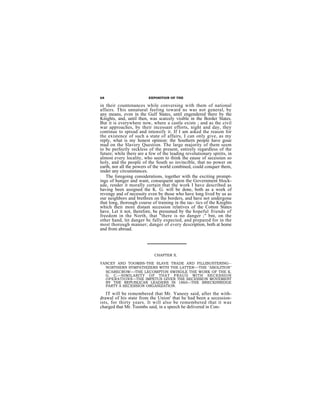
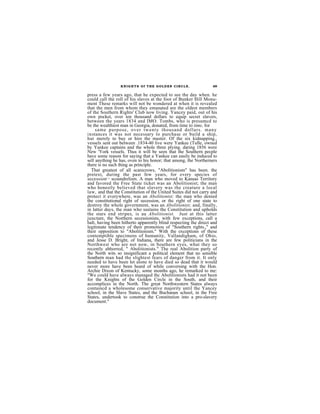
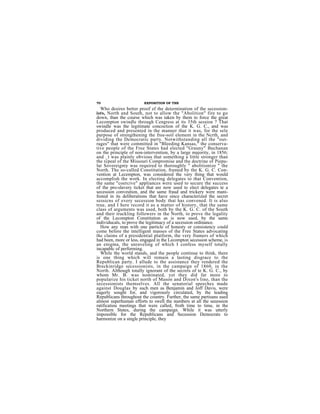
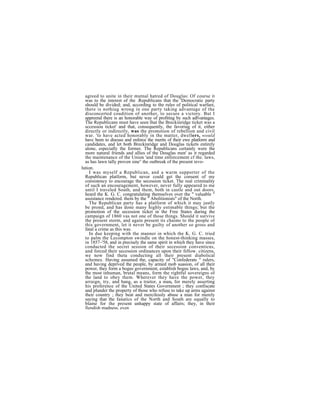
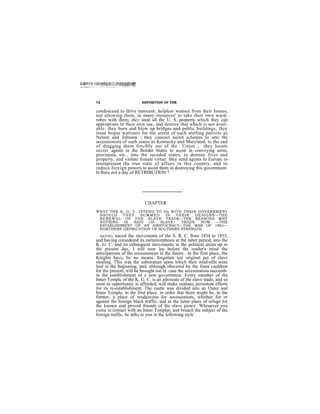
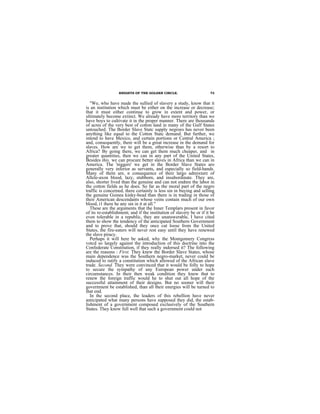
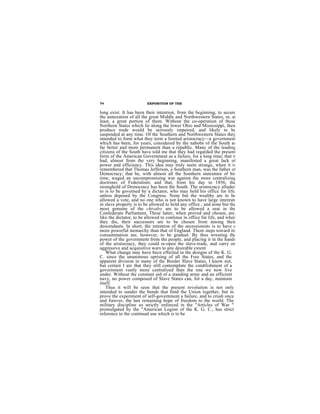
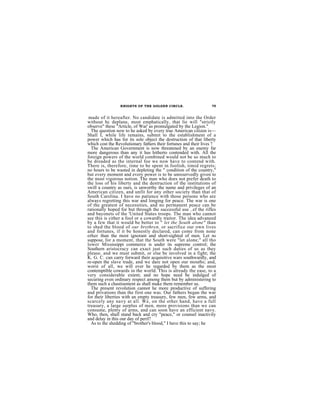
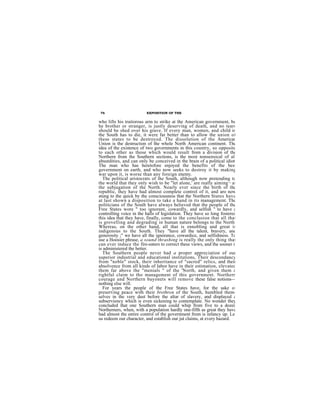
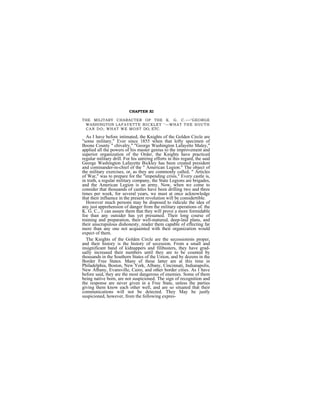
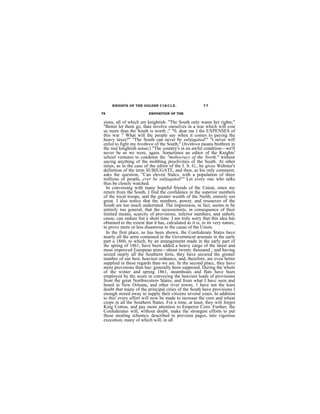
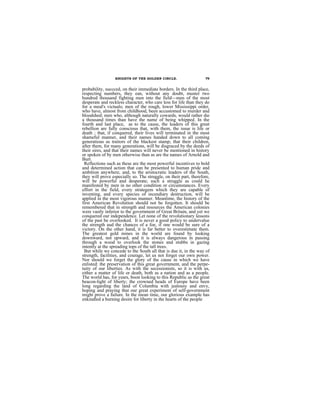
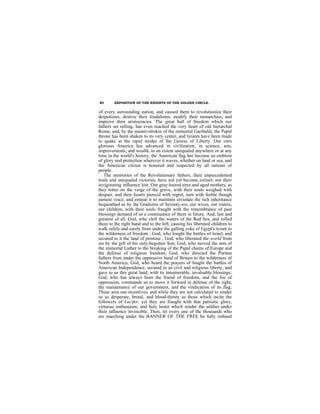
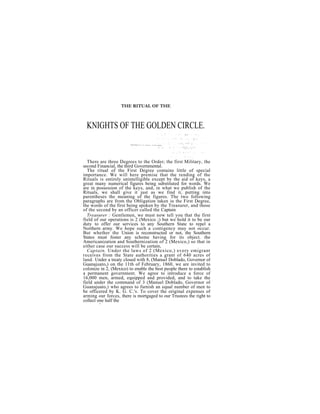
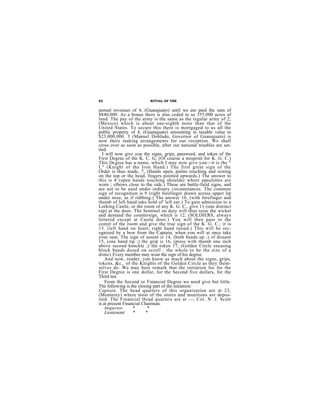
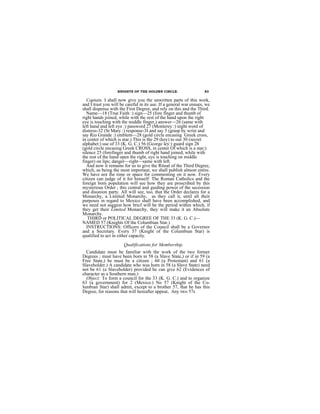
![84 RITUAL OF THE
can confer the degree on others, the oldest 57 acting as Governor.
Council Hall * * *
APPROACHING CANDIDATES —Of course all 33 (K. G. C.)
know each other. There being two 57 in hailing distance of the
court house of said county—thuckt is, 64 (within the county,)
they will confer together as to the worthiness of any 33, whom
they may think a proper person to be made a 57, and, having
agreed, one or both of them will go to the person, each knowing
the other is a 33, and tell him that there is a gentleman 64 (within
thc county) who has the power to confer the Third Degree, and
propose to him that all three shall, or more, if so the case go and
apply for it—telling him or them, at the same time, that the fee
will be 65 (ten dollars.) If he assents, propose a time and place,
and be punctual. Let it not be exactly the place where the degree
is to be conferred, but near. The 57 (Knights of the Columbian
Star) act as if they also sought the Degree. Also, tell the
candidate that, as lie or you mau be rejected, it will be expected
that he will not mention the matter to anyone till the result is
known.
When in the room, the Governor will take the Bible, and will
cause all to lay their hands thereon, when each will repeat after
the Governor the following :
INITIATION.
We three, (or any other number, no the case may be,) citizens of 56, (a Slave State) do
hereby and herein, in the presence' of each other and the Great Jehovah' solenmly and
sincerely pledge our faith mid honor to conceal and never reveal to any mortal being, save
such as we know to be 57, (Knights of the Columbian Star,) any circumstance or thing
that may here transpire during the next hour, and to keep the knowledge of this hour
forever secret from all but 57. In the name of God. Amen!
[All take seats.]
SECRETARY. What are you that you are thus loading off in this work, with which you
seem so familiar?
GOVERNOR. I am, what you are, a 57; you bring the Secretary and I the Governor of this
Council, and I here promise to conscienctiously do my duty at all times while I hold
fellowship with the 33. But, sir, will you explain why it was necessary to proceed as we
have ?
SECRETARY. We thus proceed because the laws of the Order demand it, and because the
Order will lose its efficiency as soon as it ceases to be absolutely secret. lt is not permitted
that we shall be known to any person living, except to those who are 57. Von will find
nothing in the Order of which to he ashamed. Not even the 33 must know who has this
Degree. That is, perhaps, the only real secret order in the World. It must be kept secret !
Governor. (To Candidate.] I have a few questions to ask you, which I trust you will answer
without reserve, for I pledge you my word as a man, as a 57, and as Gov. ernor of this
Council, that I am in earnest in this work, and would not have sought you out, unless I
had thought this whole work would moot your unqualified approbation.
1. Give me the sign, password and grip of a 1 (Knight of the Iron Hand.)
2. Give me the signs, password and grip of a 18 (True Faith.)
3. To what 66 (Castle) do you belong?
4. Where were you born?
5. Where was your father and mother born?
6. Are you 60 (a Protestant) or 67 (a Roman Catholic?)
7. Where do you now live?
8. Do you belong to any other secret society?](https://image.slidesharecdn.com/kgc-130106202116-phpapp02/85/Kgc-84-320.jpg)
![KNIGHTS OP THE GOLDEN CIRCLE. 85
9. Married or single ?
10. Arc you 61 (a Slaveholder ?)
11. Will you stand firm in your obligation to the 33 (K. G. C.?)
12. Do you believe in the religion of Jesus Christ ?
13. Are you willing to help in spreading it ?
Secretary. Judging from what you have seer of the 33 Project, and by what you know of
us, are you now willing to be united with no in a society from which you can never resign,
but which can in no way compromise you, since the only work and responsibilities we put on
you arc these:
1. Secresy as to who the 57 are.
2. To attend every cad of a Council made by the Governor General of this State.
3. To do for every brother whet every brother has sworn to do for you.
4. To inform the nearest working brother known to you, of danger to the n or 57.
5. To exercise a cautious prudence in counteracting false impressions of the 33, and to
report, to 56, (George Dickley) or his successor or successors, any improper or dangerous
actions you may know of,
6, To respond to the call of any brother in your country.
7. And never to speak of the work and character of this degree of the 33 to any ono
except 57, only as you express. sentiments taught by the order.
Wet shall not force you to work unless you desire to do so, but on the call of five brothers
you must respond, if in your power to do so. Once a 57, (Knight of the Columbian Star)
you will live and die, though no mortal man may know it but 57. Governor. Are you willing to
proceed ?
[Candidate answers, yes]
Secretary. Every knee shall bend to God, and every tongue confess his name, Governor.
Brothers, w e will kneel for prayer. *
Governor. Mr, Secretary, collect the fees of this (or these] candidates, and we will proceed in
GMT work of initiation.
OBLIGATION DELIVERED BY GOVERNOR.
Before God and these witnesses, I do vow that 1 will never reveal the sips, grips,
passwords, tokens or significants of the 57, (Knights of the Columbian Star) to any man,
woman or child, except to a 57 in goof and lawful standing, and then only as hereafter
directed, and for the lawful purposes of this Crier. And I pledge and commit myself fully
and freely to each of the following obligations, and in perfect good faith:
1st. I vow and promise to conceal the names of the 57, the objects and character
thereof, and never to speak of the same as tbough I Was a member, except to those who
can give me our sacred word in such a way as to satisfy me they are 57.
2d. No matter what secrets may be gluon to me by a 57, if giver as the secret of a 57
and because I am one, I will hold the same sacredly in ray men knowledge, and never
recommunicate it, even to a 57, (Knight of the Columbian Star) unless authorized so to do
by the brother whose secret it is. I will never speak evil of a brother 57, either before his
face or behind his bock. I will never dishonor the wife or daughter of a 57, I knowing them
to be such' but 1 will shield and protect the character of all 57 whom I may know to be
such, their wives, daughters and families.
3d. I will oppose, to the utmost of my ability, and never consent, but vote against the
admission of any confirmed drunkard, professional gambler, rowdy, convict. felon, 68,
(Abolitionist,) negro, Indian, minor, idiot or 69, (Foreigner,) to membership in this
department of the 33, but I will get as many good and eligible 70 (Southern born men) to
jolts this Degree as I can.
4th. *
5th. * * *
6th. I do promise and vow that I will nee my best exertions to find out any and every 68
(Abolitionist) In my county, whether 71 (man, woman or child,) and for- ward the name of
such to 56, (George Mickley) or his lawful successor, or, in case I remain in the 72 (United
States) after 56 and the 83 have gone to the. 2, (Mexico) I will report the same to the
Governor-General of this State, and I will keep a close watch on all such, and report at
every reacting of my Council. for the information of the 57 remaining in the 72 (United
States ) If I know of any 68 who is a 73 (stran-
ger or traveler) trading with l00 (negros) or doing any other unlawful act I will at once
inform all 57 in my country—shall call. the 57 to meet in Council, that proper steps may
be taken for 74 (his exposure.)](https://image.slidesharecdn.com/kgc-130106202116-phpapp02/85/Kgc-85-320.jpg)
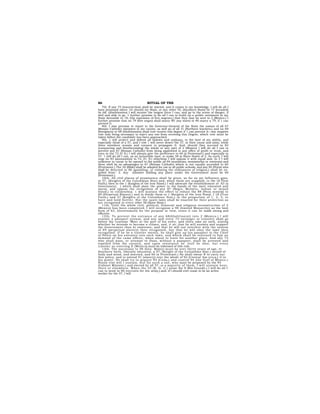
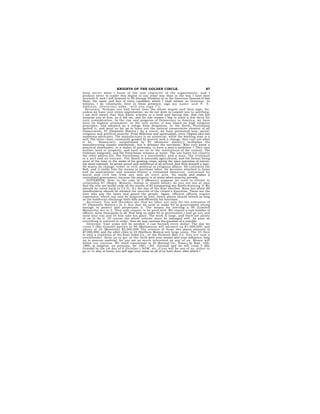
![will give you the Ceremonial of this Degree. [Candidates sign at the end of the
work; and he also signs his own work.]
Secretary. The signs, test signs, words and passwords, grips and pass-grips,
88 ns and keys of this degree must be well THE GOLDEN CIRCLE. per use depends
toke RITUAL OF THE KNIGHTS OF learned, for on their pro
your standing in this Order. Notice them, practice them, and heed them.
[The candidate is here made to sign the obligation, as also a copy for himself. When
he has done this, present bins with a copy and a key of the Degree
Signs, &c.—( These are now to he given in full and explained.) See Key.
[ Th e ke y he re men t i one d we h ave . We wi l l g i ve i t i n s u c h a fo rm t h at the
reader will understand it. The sign is a [raise hat with left hand over right, open
hand on top of head.] The countersign is b [left hand with hat extended to right
angles, hand by side.] The silent alga is c [left hand on back of head ] The
answer is d [right hand on forehead, then extended.] The night sign is e i two
distinct claps of hands, and repeat once.] The test sign is f finger and thumb of left
hand take hold of lip.] The sacred word is g [Eloi.] The password is h (Andalusia]
and to this is added, in parenthesis, "Notice instructions in use of words." The
night word given with o is s [high.] Th e grip is j [as given.] The pass grip i s k
[same with left hand, still holding by right.] The token or emblem is l [same as
shown.] The answer to f is as fright thumb and fore finger on pit of stomach.]
That's all we have at present to give, and, as we have said, it may be relied on as
authentic. It is a revelation of the mysteries of an Order which claims to be, and no
doubt is, powerful in our land. Its emmissaries have lured into it thousands of young
men, by impressing them with utterly false ideas of its nature and designs. The
members of the First and Second degrees know nothing of the Third, although they
are unwittingly guided and controlled by it. Let them examine the revolting character
of the obligations of the Third Degree, and then make all haste to repudiate an
organization that deserves the scorn and abhorrence of all just men.
The reader will remark that General Bickley insists in his circular, that " it is
exceedingly desirable and important to organize the State of Kentucky before the
August elections.'' No doubt the intention or the Order in to make its power felt
in various ways nu the day of the election. We. look forward with no little interest to
the result.
The Roman Catholics and foreign born citizens will find much in the Mittel of the
Third Degree deserving their attention. Irishmen In particular will meet with
something interesting to themselves.
If public opinion has not utterly lost its virtue, it will speedily sweep this
miserable Order off the face of this earth. Will Geo. Bickley dare, after the
exposition, to show his face among men ? Will any Knight of the Golden Circle
have the audacity to avow himself one, or let himself he known as one ? Is It true,
can it he true, that men of respectable standing in our community acknowledge,
either before the world or In their own hearts, the obligations of the Third Degree of this
infamous association
The K. G. C.'s declare for a Limited Monarchy, and say that it will he time enough to
discuss the question of a Republic when all the extraordinary purposes that they
propose to themselves shall have been accomplished.
The K. G. C.,s of the Third Degree, It seems, look keenly to office. They require
that all the members of their Degree shall have offices before any member of the
Second Degree can be accommodated, and that all the members of the Second
Degree shall be provided with offices before a solitary Individual of the First can be
accommodated. But then they say that they are going to have thousands of offices,
and they mean that the incumbents of office shall hold on for life.
It is no wonder that the members of the Third Degree, Knights of the Columbian
Star, as they call themselves, guard carefully in their filth al against ever being
known as such, even to their brethren of the First and Second Degrees.
Let all bear steadily in mind that the Order of the Knights of the Golden . Circle is
now and has all along been the central sun of the Secession party of Kentucky.](https://image.slidesharecdn.com/kgc-130106202116-phpapp02/85/Kgc-88-320.jpg)